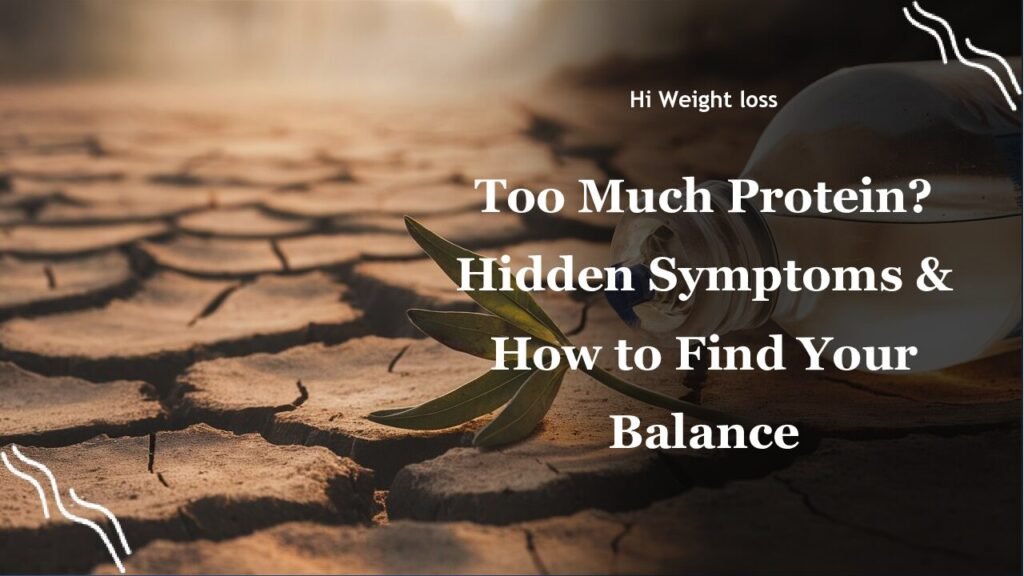“`
Are you feeling constantly fatigued, battling digestive issues, or experiencing unexplained dehydration despite trying to eat healthily? You might be unintentionally overloading your body with too much protein, leading to a range of uncomfortable symptoms. It’s a common misconception that more protein is always better, but as I learned the hard way during my brief stint on a very high-protein diet, an excessive intake can throw your body off balance. This article will explore the various symptoms of excessive protein intake, explain why they occur, and guide you on how to find the right balance for your health.
Understanding the Impact of Excessive Protein
We all know that protein is crucial for building and repairing tissues, producing enzymes and hormones, and supporting overall health. However, like anything else, consuming too much protein can lead to a variety of problems. It is a bit like overwatering a plant; you may think you are helping it grow, but too much water can be more harmful than good. You will want to make sure you are aware of the potential side effects of high-protein diet.
Dehydration: More Than Just Thirst
One of the most common symptoms of excessive protein intake is dehydration. This occurs because your kidneys work harder to process and eliminate the waste products of protein metabolism. This process requires a significant amount of water, leading to increased fluid loss.
I recall a time when I was trying to bulk up and consumed protein shakes almost constantly. I started experiencing intense headaches, a fuzzy feeling in my head, and was constantly thirsty. It was more than just needing a drink; it was a deep, persistent dehydration that didn’t subside with just a glass of water. This was a clear indication my body was struggling to cope with the amount of protein I was throwing at it. These symptoms of dehydration can include headaches, brain fog, fatigue, and dizziness.
According to the NYMD Center, excess protein forces the kidneys to work overtime to process waste, leading to dehydration and these related symptoms.
Digestive Discomfort: Intestinal Issues and More
If you are consuming too much protein, your digestive system might react negatively. Common complaints include intestinal discomfort, indigestion, and even diarrhea. The body struggles to efficiently process massive amounts of protein.
A friend of mine, Sarah, once tried a popular high-protein diet to lose weight, and she was constantly complaining of indigestion and discomfort. She said she felt bloated and like food was just sitting in her stomach. I didn’t realize it then, but the diet she was on was likely causing those digestive problems.
These digestive issues are not always pleasant, as Medical News Today points out. These symptoms can sometimes be quite severe if the problem is not addressed.
Additionally, some high-protein diets drastically reduce the intake of carbohydrates, which can lead to diminished fiber intake, causing constipation and other gastrointestinal issues.

Fatigue and Nausea: When Your Body Overworks
You might think eating lots of protein will give you energy but the opposite is often true. Excessive protein consumption can lead to fatigue, as your body works harder to break down and metabolize the excess, depleting energy reserves.
My own experience with those protein shakes also included a period of unexplained tiredness. I was getting plenty of sleep, but would still feel sluggish, struggling to get through the day. As Healthline notes, fatigue is a common symptom of overdoing protein.
Along with fatigue, you might also experience nausea. Your body may react negatively to the excessive protein, and nausea can often be accompanied by other stomach related symptoms.
The Hidden Risks of High-Protein Diets
The health risks of consuming too much protein are not limited to the more common symptoms mentioned above. Over time, excessive protein intake can have long-term consequences on your overall health.
Strain on Kidneys and Liver
As we have discussed, the kidneys play a crucial role in processing and removing waste from protein metabolism. If your protein intake is consistently high, your kidneys may become strained, particularly if you have pre-existing kidney issues. Similarly, the liver also can be put under pressure if it is having to process too much protein and other macronutrients. Over time, this can potentially lead to liver damage.
Hormonal Imbalance
A very high protein diet, especially when it is combined with carbohydrate restriction, might reduce testosterone levels and increase cortisol levels in men. This can lead to hormonal imbalances that affect overall health, including sexual health and fertility.
Bad Breath and Increased Cancer Risk
When carbohydrate intake is reduced drastically in favor of protein, the body enters a metabolic state called ketosis. This can produce chemicals that lead to bad breath. Some studies suggest that high-protein diets, particularly those rich in red meat and saturated fats, can increase the risk of certain cancers.
Heart Disease and Calcium Loss
High-protein diets that focus on red meat and saturated fats can lead to heart disease due to increased cholesterol and fat intake. There is also evidence that diets high in meat can cause calcium loss, potentially leading to osteoporosis and poor bone health in the long term.
Recognizing the Signs: A Summary of Symptoms
To help you better recognize the signs that you might be consuming too much protein, here’s a summary of the key symptoms:
| Symptom | Description |
|---|---|
| Dehydration | Increased fluid loss, leading to headaches, brain fog, fatigue, and dizziness. |
| Intestinal Discomfort | Indigestion, bloating, and diarrhea due to inefficient protein processing. |
| Fatigue | Constant tiredness and reduced energy levels. |
| Nausea | Stomach discomfort, sometimes with vomiting. |
| Constipation | Reduced fiber intake resulting in bowel movement difficulties. |
| Kidney Strain | Overworked kidneys struggling to filter out waste products. |
| Liver Strain | Increased workload on the liver, possibly leading to long term damage. |
| Hormonal Imbalance | Reduced testosterone and increased cortisol levels. |
| Bad Breath | Unpleasant fruity smell caused by ketosis. |
| Increased Cancer Risk | Possible increased risk of certain cancers. |
| Heart Disease | Increased risk associated with high intakes of red meat and saturated fats. |
| Calcium Loss | Potential loss of calcium leading to osteoporosis. |
Conclusion
The pursuit of health can sometimes lead us down paths that, while well-intentioned, are not always the best. The belief that “more protein is always better” is a common misconception. As we’ve explored, the symptoms of too much protein in your body can range from mild dehydration and digestive discomfort to more serious issues, such as kidney strain and hormonal imbalances. Recognizing these signs early is crucial for your overall wellbeing. I experienced the dehydration and fatigue firsthand, and it made me realize the importance of balance in a diet.
It is important to remember that protein is essential but that doesn’t mean you should aim to consume as much as possible. Listen to your body, and if you are experiencing any of the symptoms discussed in this article, it may be time to re-evaluate your protein intake. Share this article with anyone who might be struggling with these symptoms and help them learn about the importance of a balanced diet. Remember, a balanced diet is the key to sustainable health and wellness.
FAQ
How much protein is too much?
The right amount of protein varies based on age, gender, activity level, and overall health. As a general guideline, the recommended daily protein intake is about 0.8 grams per kilogram of body weight. Always consult a healthcare professional or nutritionist for personalized advice.
Can too much protein cause weight gain?
Yes, consuming excessive protein can lead to weight gain. This is because the excess protein that your body doesn’t need can be stored as fat, if it is not used for energy. Also, the foods that are high in protein are often also high in fat.
How can I ensure I’m getting the right amount of protein?
Focus on a balanced diet that includes a variety of protein sources, such as lean meats, fish, eggs, dairy, legumes, and nuts. Consult with a nutritionist to help you tailor a diet plan based on your specific needs.
What should I do if I think I’m consuming too much protein?
If you suspect that your body is not responding well to your high protein diet, reduce your protein intake and increase your water intake to counter any dehydration that is occurring. Monitor how you feel and if the symptoms persist, seek medical advice.
Are there any long-term risks of consuming excessive protein?
Yes, consistent overconsumption of protein can lead to kidney strain, liver problems, and hormonal imbalances over time. There may also be an increased risk of heart disease and cancer. It’s important to find a balance, and not over consume protein.
“`



